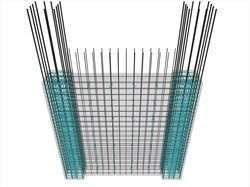How to improve load distribution for bends and shear walls
One of the most important things to consider when it comes to construction is load distribution.
Properly distributed loads help prevent damage and failure in bends and wall shear.
However, common errors when distributing loads can lead to costly repairs or accidents.

Here are some tips on how to improve load distribution for your next project:
-
Plan ahead by determining the type and quantity of materials required before the job begins
This will help ensure that no particular area is overloaded during construction.
-
Pay attention to where you put heavy items, such as appliances or furniture
Avoid placing too much weight on one side of a wall or room – this can cause the structure to become unbalanced and possibly collapse over time.
-
Use appropriate supports as necessary, such as braces or beams
To strengthen areas that may be under more pressure from heavy objects that are placed there on a regular basis (eg, a sink in the bathroom).
By following these simple tips, you can rest assured that your curve or shear wall will withstand whatever load is placed on it.

Benefits of improving load distribution
Load distribution is important for any structure, be it a building, a bridge,
or even just a simple piece of furniture.
But what exactly are the benefits of improving load distribution?
1. Avoid uneven wear
One of the most obvious benefits of improving load distribution is that it can help avoid uneven wear of building materials.
When weight is evenly distributed over a surface, there is less chance of localized damage caused by a concentrated force.
This can extend the life of your materials and save you money in repair or replacement costs.
2. Improve overall stability
Improving load distribution also improves the overall stability of structures by distributing weight more evenly throughout.
This reduces the possibility of one area taking on too much pressure,
which could eventually collapse if left unchecked.
For example, bridges with good load bearing reinforcement can support much more weight than bridges without proper reinforcement.

3. Reduce stress on individual components
Other load balancing offerings come in the form of stress reduction on individual components.
An unbalanced structure places undue stress on certain areas, leading to an increased risk of failure.
However, when the loads are properly distributed, the structure can withstand greater stresses with a reduced risk of failure.
So not only does improved load balancing improve overall safety, it can also reduce maintenance and repair costs.
efficiency
Increased Efficiency A final benefit worth noting is that balanced loads tend to conserve energy.
The improvement helps transfer weight more efficiently, so less effort is required to move or lift an object.
This added advantage applies to natural systems such as our muscles and man-made lifting devices such as cranes,
forklifts, and other heavy machinery.
In conclusion, these are just a few of the major benefits of proper load distribution.
As you can see, there are many advantages to ensuring that the weights are evenly distributed across the surfaces.
By enhancing load equalization, you can greatly improve the efficiency, durability, and safety of any system.
The importance of properly distributing loads
Load distribution is key when building something sturdy – whether it’s a wall, a house,
or even just muscle. Uneven loads can lead to all kinds of problems down the line,
from cracks and weakness to tipping and breaking.
Why is proper load distribution important?
It helps prevent these issues by distributing the weight more evenly across the chassis.
Not only that, but properly distributed loads also improve overall stability.
In other words:
If you want something built to last, make sure you distribute the loads properly.

How to avoid common mistakes when optimizing load distribution
When optimizing load distribution, some common mistakes can lead to disastrous consequences.
To avoid these errors, here is what you need to do:
- Make sure you take into account all loads.
- Consider second order effects when distributing loads
- Consult a professional who has experience with this type of analysis.
- Follow all safety guidelines to avoid hazards and hazards.
For more architectural news







Thanks